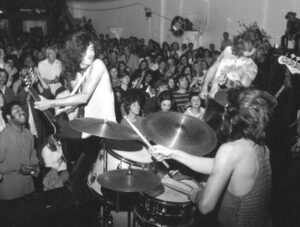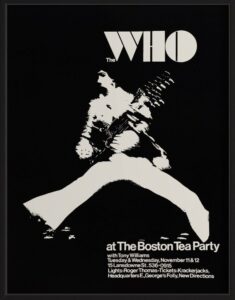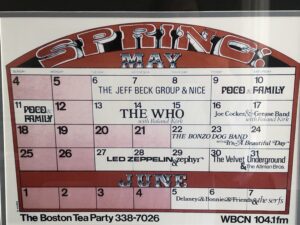By Sharon Oliver, Contributing Writer

BOSTON – During the late 1960s, The Boston Tea Party concert venue was ground zero for the city’s rock and roll subculture. Jonathan Richman of the proto-punk band The Modern Lovers remembered the crowd as a very diverse one.
“Wall-to-wall hippies, bikers, Harvard students, Northeastern students, fashion models, professors, drug dealers, art teachers, groupies, MIT students,” recalled Richman, who grew up in Natick. “Photographers, local thugs, local disc jockeys, skinny-bohemian-artist girls, visiting dignitaries from the New York art scene, and the royalty of the Boston music set—the local singers and guitar-players in their mod suits strolling around with their beautiful girlfriends.”
Former house of worship
It was a far cry from the political protest at Griffin’s Wharf in 1773 in which angry colonists dumped 342 chests of tea into the harbor because they were frustrated with Britain’s taxation without representation. This tea party was instead associated with the psychedelic movement that swept the country in the late 1960s.

In 2005, Aerosmith’s lead singer Steven Tyler, told Rolling Stone magazine, “The two shows I remember where I just sat with my mouth open was that Yardbirds show (in Connecticut which his first band Chain Reaction opened for) and Led Zeppelin at the Boston Tea Party in 1969.”
The Boston Tea Party venue opened its doors in January 1967 in a building that was built as a synagogue and later served as a Unitarian meeting house. The land it stood on was donated by Boston merchant John Gardner, whose son Jack married famed art collector and socialite Isabella Stewart. Initially, the venue was home to Filmmakers Cinematheque, which featured “underground” movies by Andy Warhol and others. However, to support the film programs, the decision was made to hold a series of weekend dance concerts. Before long, it became a favored destination for rock and blues artists as well as a must-play spot for bands on their first U.S. tour.
Although Warhol managed the Velvet Underground as the house band for his New York City studio The Factory, the band used The Boston Tea Party as its home base for several years. One night in 1968, guitarist Lou Reed announced on stage, “This is our favorite place to play in the whole country.”
Iconic bands and wild times

For only $3 or $3.50, concertgoers could see acts like Cream, the Grateful Dead, The Allman Brothers, Jimi Hendrix, The Who, Pink Floyd, and Sly and the Family Stone. Reportedly, Mick Fleetwood of Fleetwood Mac was there so often many thought it was his second residence. There are numerous stories of some wild times at The Boston Tea Party.
One night Little Richard danced vigorously on top of a piano and stage manager Stanley Kastner had to hold onto it so that it would not fall over. According to Kastner, Little Richard went backstage during the midst of a 45-minute ovation for his performance to get paid. The “Good Golly, Miss Molly” singer proceeded to retrieve a pistol from a metal briefcase, counted the money, and left. The crowd was out front still applauding.
In 1968, radio station WBCN-FM, the first album rock station in Boston, began broadcasting out of a back room at The Boston Tea Party. It later went on to becoming the rock station with the highest ratings in Boston and lasted over 40 years as “The Rock of Boston.”
Unfortunately, The Boston Tea Party was not everyone’s cup of tea. Some local politicians and law enforcement officers had a problem with the racially-mixed crowd of rock and roll fans and rumors of drug use. One night when the Scottish rock band The Clouds was performing, dozens of Boston police officers stormed into the hall looking for drugs. Leading the group of officers was Boston Licensing Commissioner Albert L. “Dapper” O’Neil, who brought along a Boston Herald-Traveler reporter who was hoping for a story. No drugs were found but the police arrested management for an expired license to sell soft drinks. The Herald-Traveler’s headline read: “Soda Pop Raid Fizzles.”
Unable to compete with the rise and popularity of large rock concert arenas, The Boston Tea Party closed its doors in December 1970.
RELATED CONTENT:
Boston’s legendary rock club ‘The Rat’ is still remembered fondly (fiftyplusadvocate.com)
The Channel nightclub was one of Boston’s top live music spots in the ’80s (fiftyplusadvocate.com)
Somerville nightclub Johnny D’s was a second home to many (fiftyplusadvocate.com)












